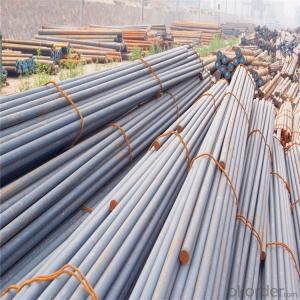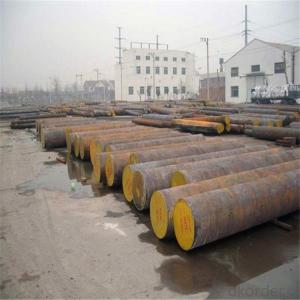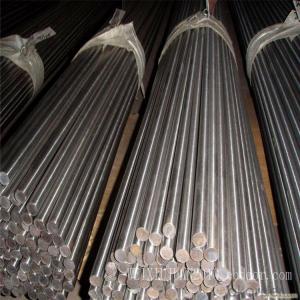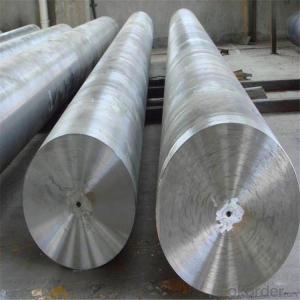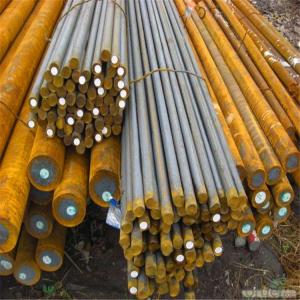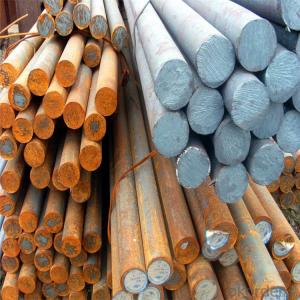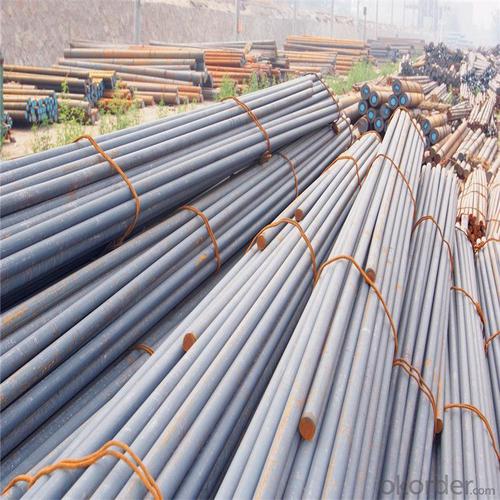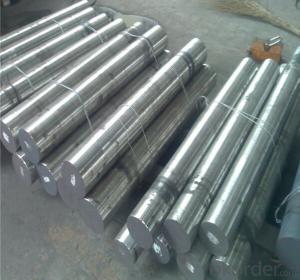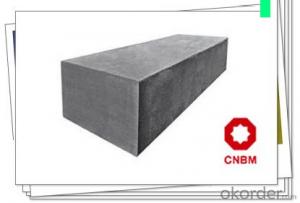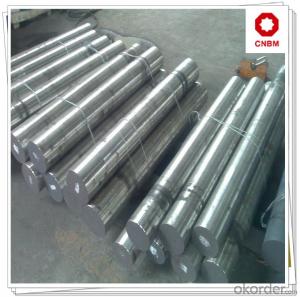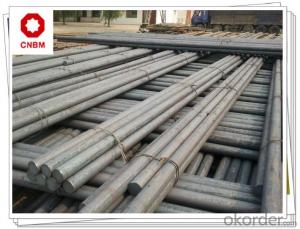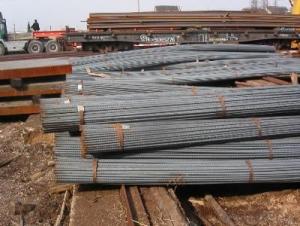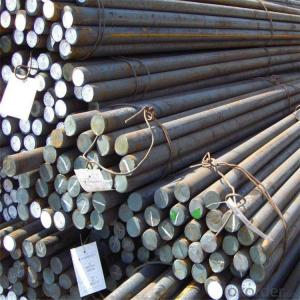ASTM1020 Carbon Structural Steel SAE1020 Steel Bar
- Loading Port:
- Tianjin
- Payment Terms:
- TT OR LC
- Min Order Qty:
- 25 m.t.
- Supply Capability:
- 500000 m.t./month
OKorder Service Pledge
OKorder Financial Service
You Might Also Like
Specification
ASTM1020 Carbon Structural Steel SAE1020 Steel Bar
Product Description of ASTM1020 Carbon Structural Steel SAE1020 Steel Bar
1. Steel grade: SAE1020, 20#, C22, S20C
2. Length: 6M-12M
3. Diameter: 16mm-300mm
4. Product range: round bar, flat bar, square bar
5. Technique: Hot rolled, forged, cold drawn
Specification of ASTM1020 Carbon Structural Steel SAE1020 Steel Bar
Material | SAE 1020 | Round bar | Dia(mm) | 16-300mm |
Process | EAF + LF + VD + Forged + Heat Treatment (optional) | Length (mm) | Max 12m | |
Heat treatment | Normalized / Annealed / Quenched / tempered | Flat bar | Thickness(mm) | 8-500mm |
Delivery condition | Hot forged +Rough machined (black surface after Q/T)+ Turned (optional) | Width(mm) | 70-200mm | |
Test | Ultrasonic test according to SEP 1921-84 D/d | Length (mm) | Max 12m |
Chemical Composition of ASTM1020 Carbon Structural Steel SAE1020 Steel Bar
C | Si | Mn | Cr | Ni | Cu |
0.17~0.23 | 0.17~0.37 | 0.35~0.65 | ≤0.25 | ≤0.30 | ≤0.25 |
Photo Show of ASTM1020 Carbon Structural Steel SAE1020 Steel Bar
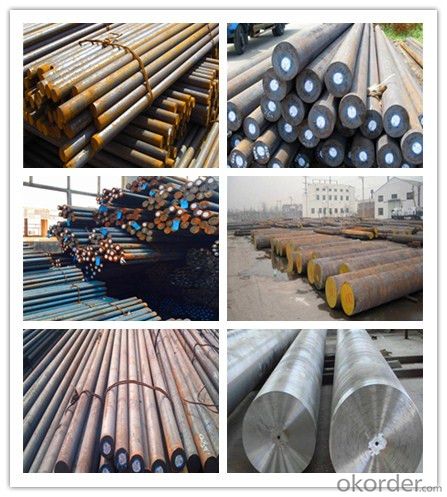
Packing and Delivery:
Packing in bundle package, or as customer's requirements.
Delivery Detail: 45 days after receiving the deposit.
Usage and Applications of ASTM1020 Carbon Structural Steel SAE1020 Steel Bar
1. Steel round bar is used in a large number of architectural and engineering structures. Or it can be used in construction of plants for the production of steel house frames, high-voltage transmission towers, bridges, vehicles, boilers, containers, ships, etc.
2. And we can use this kind of product on the performance of the mechanical parts if the demand is not very high.
3. Some special material steel round bar can be used for main shaft of steamer, hummer shank, with big section and supper force.
Company Information
CNBM International Corporation is the most important trading platform of CNBM group.
Whith its advantages, CNBM International are mainly concentrate on Cement, Glass, Iron and Steel, Ceramics industries and devotes herself for supplying high qulity series of refractories as well as technical consultancies and logistics solutions.


F A Q
1, Your advantages?
professional products inquiry, products knowledge train (for agents), smooth goods delivery, excellent customer solution proposale
2, Test & Certificate?
SGS test is available, customer inspection before shipping is welcome, third party inspection is no problem
3, Factory or Trading Company?
CNBM is a trading company but we have so many protocol factories and CNBM works as a trading department of these factories. Also CNBM is the holding company of many factories.
4, Payment Terms?
30% TT as deposit and 70% before delivery.
Irrevocable L/C at sight.
5, Trading Terms?
EXW, FOB, CIF, FFR, CNF
6, After-sale Service?
CNBM provides the services and support you need for every step of our cooperation. We're the business partner you can trust.
For any problem, please kindly contact us at any your convenient time.
We'll reply you in our first priority within 24 hours.
- Q: Can steel round bars be used in the manufacturing of flanges?
- Certainly, the utilization of steel round bars is feasible for the production of flanges. Flanges are typically employed for the interconnection of pipes, valves, and other equipment in diverse industrial applications. Although flanges can be constructed from various materials like carbon steel, stainless steel, or alloy steel, steel round bars are commonly preferred due to their robustness and longevity. The round bars can be machined or forged into the desired flange configuration and subsequently subjected to further processing to fulfill specific requirements, such as size, thickness, and flange face type. Steel round bars possess exceptional mechanical properties and can withstand substantial pressures, rendering them suitable for application in flange manufacturing.
- Q: How do steel round bars perform in outdoor or marine environments?
- Steel round bars generally perform well in outdoor or marine environments due to their inherent strength and corrosion resistance. The composition of steel, particularly stainless steel, enables it to withstand exposure to moisture, saltwater, and other harsh elements without significant degradation or rusting. This makes steel round bars a dependable choice for construction, infrastructure, and marine applications where durability and longevity are crucial.
- Q: What are the different types of steel round bars used in the manufacturing of tools?
- There are several different types of steel round bars that are commonly used in the manufacturing of tools. Each type of steel has its own unique properties and characteristics that make it suitable for different applications. Here are some of the most common types of steel round bars used in tool manufacturing: 1. Carbon Steel Round Bars: These are the most commonly used type of steel round bars in tool manufacturing. They are known for their high strength and durability, making them ideal for heavy-duty applications. Carbon steel round bars can be further classified into low carbon, medium carbon, and high carbon steel, depending on the amount of carbon content present. 2. Alloy Steel Round Bars: Alloy steel round bars are made by adding various alloying elements such as manganese, chromium, nickel, or molybdenum to carbon steel. This results in enhanced strength, hardness, and resistance to wear and tear. Alloy steel round bars are commonly used in the manufacturing of cutting tools, drills, and gears. 3. Stainless Steel Round Bars: Stainless steel round bars are known for their corrosion resistance and high tensile strength. They are commonly used in the manufacturing of tools that require resistance to rust, such as kitchen knives, surgical instruments, and automotive components. 4. Tool Steel Round Bars: Tool steel round bars are specifically designed to be used in the manufacturing of tools, hence the name. They have high hardness, wear resistance, and toughness, making them ideal for applications such as cutting, drilling, and shaping. Tool steel round bars can be further classified into several types based on their specific properties, such as high-speed steel (HSS), cold work steel, hot work steel, and shock-resistant steel. 5. Stainless Tool Steel Round Bars: Stainless tool steel round bars combine the characteristics of stainless steel and tool steel. They offer good resistance to corrosion and wear, making them suitable for applications where both properties are required, such as in the manufacturing of molds and dies. These are just a few examples of the different types of steel round bars used in tool manufacturing. The choice of steel depends on the specific requirements of the tool and the application it will be used for.
- Q: What are the advantages of using nickel-tin alloy steel round bars?
- There are several advantages of using nickel-tin alloy steel round bars. Firstly, the addition of nickel improves the corrosion resistance of the steel, making it suitable for applications in harsh and corrosive environments. Secondly, tin improves the machinability and workability of the steel, allowing for easy shaping and fabrication. Additionally, the alloy steel round bars exhibit high strength and excellent mechanical properties, making them ideal for structural applications that require durability and reliability. Lastly, the combination of nickel and tin enhances the overall performance and longevity of the steel, making it a cost-effective choice in various industries such as automotive, aerospace, and marine.
- Q: What are the advantages of using nickel-tin alloy steel round bars?
- There are several advantages of using nickel-tin alloy steel round bars. Firstly, the addition of nickel improves the corrosion resistance of the steel, making it suitable for applications in harsh and corrosive environments. Secondly, tin improves the machinability and workability of the steel, allowing for easy shaping and fabrication. Additionally, the alloy steel round bars exhibit high strength and excellent mechanical properties, making them ideal for structural applications that require durability and reliability. Lastly, the combination of nickel and tin enhances the overall performance and longevity of the steel, making it a cost-effective choice in various industries such as automotive, aerospace, and marine.
- Q: What are the different types of steel round bars used in the automotive exhaust systems?
- Automotive exhaust systems utilize various types of steel round bars, each possessing distinct characteristics and uses. Let's explore some of the commonly employed varieties: 1. Stainless Steel Round Bars: Renowned for its exceptional resistance to corrosion and high temperatures, stainless steel stands as a favored option for exhaust systems. Its versatility allows for application in both primary and secondary components, including headers, catalytic converters, and mufflers. 2. Carbon Steel Round Bars: Carbon steel represents another frequently employed material in exhaust systems. Its commendable strength and durability render it suitable for various components, such as exhaust pipes and hangers. However, due to its susceptibility to corrosion in comparison to stainless steel, appropriate coating or treatment becomes imperative to prevent rusting. 3. Aluminized Steel Round Bars: Aluminized steel, a form of carbon steel coated with an aluminum-silicon alloy, boasts excellent corrosion resistance and heat reflectivity. These attributes make it an ideal choice for exhaust systems, particularly in exhaust pipes and mufflers, as it aids in heat reduction and enhances overall durability. 4. Titanium Round Bars: Although less commonly utilized due to its substantial cost, titanium serves as an extraordinarily lightweight and durable material, offering exceptional corrosion resistance. In high-performance or specialized exhaust systems, titanium round bars may be incorporated to reduce weight and improve overall performance. Its presence is often observed in exhaust tips and high-end aftermarket exhaust systems. In conclusion, the selection of steel round bars for automotive exhaust systems hinges on various factors, including cost, performance requirements, and specific application needs. Manufacturers meticulously choose the appropriate steel type to ensure longevity, efficiency, and compliance with emissions regulations.
- Q: Can steel round bars be used as axles or shafts?
- Yes, steel round bars can be used as axles or shafts due to their high strength, durability, and ability to withstand heavy loads and torque. They are commonly used in various industries such as automotive, marine, and construction for their excellent mechanical properties and reliability.
- Q: 1, three, two, steel, wire rod, round steel what is the difference?
- Round steel is a solid strip of steel whose cross section is round. The specifications are expressed in millimeters of diameter, such as "50", which means a round bar of 50 millimeters in diameter. Round bar is divided into three parts: hot rolling, forging and cold drawing. Standard Specification for hot rolled round steel is 5.5-250 mm. Among them, 5.5-25 mm small round bars are mostly supplied by straight strips. They are used as reinforcing bars, bolts and various mechanical parts. They are more than 25 millimeters of round steel. They are mainly used in the manufacture of mechanical parts or seamless steel tube billets.
- Q: What are the different tolerances for steel round bars?
- The different tolerances for steel round bars depend on various factors such as the diameter, length, and intended application. Common tolerances for steel round bars include diameter tolerances ranging from +/- 0.005 inches to +/- 0.030 inches, length tolerances ranging from +/- 0.125 inches to +/- 0.500 inches, and straightness tolerances ranging from 0.0125 inches per foot to 0.030 inches per foot. However, specific tolerances may vary depending on the specific requirements set by the industry or customer.
- Q: Can steel round bars be used for tooling applications?
- Yes, steel round bars can be used for tooling applications. Steel round bars are often chosen for tooling applications due to their high strength, durability, and ability to withstand heavy loads and wear. They can be machined, shaped, and heat-treated to meet specific tooling requirements, making them versatile and suitable for various tooling applications.
Send your message to us
ASTM1020 Carbon Structural Steel SAE1020 Steel Bar
- Loading Port:
- Tianjin
- Payment Terms:
- TT OR LC
- Min Order Qty:
- 25 m.t.
- Supply Capability:
- 500000 m.t./month
OKorder Service Pledge
OKorder Financial Service
Similar products
Hot products
Hot Searches
Related keywords
